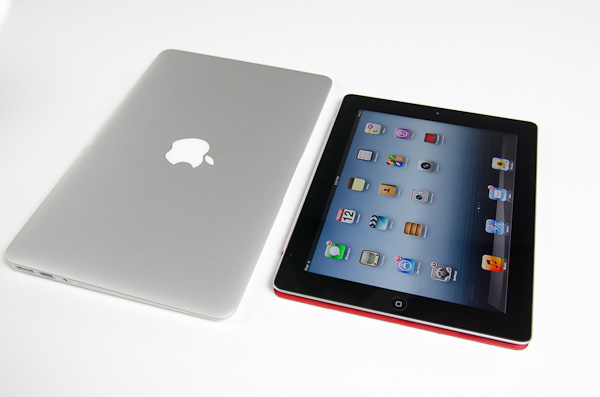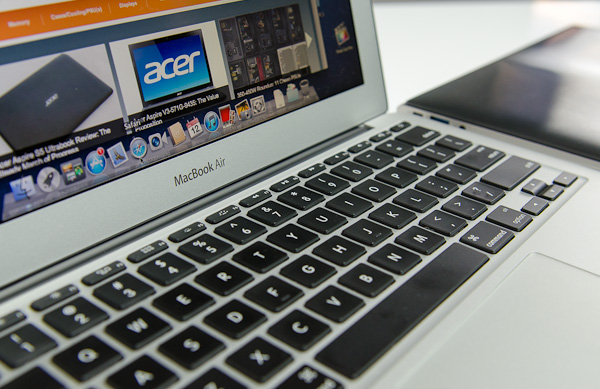The 2012 MacBook Air (11 & 13-inch) Review
by Anand Lal Shimpi on July 16, 2012 12:53 PM EST- Posted in
- Apple
- Mac
- MacBook Air
- Laptops
- Notebooks
Final Words
The MacBook Air is in its third iteration of the current design and it's tangibly better than the two that came before it. The 2010 (and older) models are just plain slow by comparison. Thanks to architectural, frequency and thermal improvements, one of the cores from a 2012 MacBook Air ends up being faster than two from a 2010 MBA. In other words, the 2012 models end up being more than twice as fast as the 2010 models in many of our CPU bound tests.
Battery life has also improved thanks to Intel's 22nm silicon. You'll get between 3 - 7 hours on the 13-inch MBA, and between 1.85 - 5 on the 11-inch model.
It's not all about Intel in the 2012 Airs however. The improvement in storage performance is even more revolutionary. Similar to the rMBP, with the 2012 MacBook Air Apple has entered the world of modern SSD performance. The impact of the faster SSDs is felt everywhere from boot to application performance. Once again there are two SSD suppliers, but unlike in previous models both can be deliver good performance. If you use FileVault or plan on working with a ton of already compressed data, you'll want to pick a 256GB or 512GB drive to end up with Samsung's controller rather than the SandForce driven Toshiba solution.
By offering 8GB RAM and 512GB SSD BTO options, Apple has made the MacBook Air even more of an upgrade for owners of older MacBook Pros. The options aren't cheap but the flexibility in an inflexible machine is important.
The only real downside to the 2012 MacBook Air is in the display department. Apple raised the bar with the 2012 iPad and Retina Display on the MacBook Pro, the MacBook Air's display is good for a TN panel but the rest of Apple's new world has moved to high resolution IPS panels. The same is starting to be true outside of Apple as well. The competition has simply caught up and surpassed Apple in the low-cost, but high-quality display business. The MacBook Air is no longer competing against poorly designed netbooks, but a bunch of clones that are quickly approaching parity across the board. The MBA panel isn't bad, but it needs to be better.
Even without a new display however, the MacBook Air continues to be one of the best executed ultraportables on the market today. If you're after absolute portability, the 11-inch model is great. If you want a Pro replacement and can get away without four cores and a discrete GPU, the 13 gets the job done. I have no issues recommending either system.
Looking forward, Haswell will have an even more significant impact on the MacBook Air next year. Without room or the thermal budget for a discrete GPU, the MacBook Air stands to benefit even more from improved processor graphics. With 2.5x the graphics compute power of HD 4000 plus embedded DRAM, Haswell's processor graphics will bring an entirely new level of gaming performance to the MacBook Air.












190 Comments
View All Comments
KPOM - Monday, July 16, 2012 - link
Yes, this sounds like the words of an Apple fanboy:"The same is starting to be true outside of Apple as well. The competition has simply caught up and surpassed Apple in the low-cost, but high-quality display business. The MacBook Air is no longer competing against poorly designed netbooks, but a bunch of clones that are quickly approaching parity across the board. The MBA panel isn't bad, but it needs to be better."
KPOM - Monday, July 16, 2012 - link
What do you want him to say "This is an overpriced piece of junk and no one should buy it"? Would that be objective enough for you?Karltheghost - Monday, July 16, 2012 - link
No, thats not objectice either. But calling a laptop "flexible" (according to upgrades), which isn't upgradeable at all and has to send in to service for several hundred dollars and some weeks time isn't more objective.Karltheghost - Monday, July 16, 2012 - link
send in to just change a battery i meant to write. . .Tegeril - Monday, July 16, 2012 - link
The expected lifespan of the batteries in these systems is 1000 cycles @ 80% of original life. Many users of this system will never reach that number of cycles at all (and may not even consider it in need of replacement at that time!). Making the battery replacement out to be that much of a con is preposterous.I just sold a MBP that I used pretty heavily over the course of 2 years and it had just shy of 400 cycles on the battery. Overall battery health was 96% of new. They just don't need to be replaced much at all.
http://www.apple.com/batteries/notebooks.html
Karltheghost - Tuesday, July 17, 2012 - link
While you're nearly right (it's said 500 to 1000 cycles) at the expected lifespan of a battery, there are enough batterys who die a lot sooner. If one cell has a flaw, the whole pack will be useless. And this happens quite often these days, i know a lot of people who had that problem. I once got a bad battery myself, it went dead after maybe 25 cycles. And giving away your Laptop for several weeks to have a battery changed is as improper as giving your bicycle away for a month just to get a flat tire patched . . . Not to mention the exaggerated costs if this happens out of Warranty time of the battery.phillyry - Tuesday, March 26, 2013 - link
On non-Apple, cheapo-generic batteries that some OEM puts in your build just because it's a 6-cell instead of a 4-cell.Better OEMs will (hopefully) use better batteries. Apple definitely uses top-notch batteries that rarely need to be replaced within their lifetime.
Anand Lal Shimpi - Monday, July 16, 2012 - link
Unfortunately these tradeoffs apply to everything in this form factor going forward. I believe that once you've made the commitment to opt for this form factor, whether MacBook Air or Ultrabook, you've accepted the lack of user removable components. It's the appliance-ification of the PC, and the tradeoff you make for portability.Take care,
Anand
MrJim - Monday, July 16, 2012 - link
Dear Anand!I remember back in the days when we were finding out viral marketing guys from Nvidia focus groups on the forum.
Just to keep that in mind i love your site and your reviews.
BUT for example with the asus ux32vd (which is cheaper than the Air)i can add memory (for 10GB of RAM-godness) and whatever SSD i like that fits. Of course there is a extra cost but it still isnt as much as for the Air.
Ultrabooks doesnt need to be like a stone.
I think that model i namned above is a good example of that. And i hope you will discuss this in your review of it.
Sincerely from North Sweden.
Anand Lal Shimpi - Monday, July 16, 2012 - link
The UX32 is a great example, but it is thicker than the MBA/ultrabooks that don't offer that flexibility. In pursuit of ultimate portability, soldered DRAM (and soon to be soldered SSDs, just wait until you see some of the Windows 8 designs later this year) are necessary tradeoffs.That being said, as I mentioned in the conclusion of my rMBP review, I would like to see OEMs focus on introducing ultra small form factor removable DRAM standards. And I'd love to see them standardize on some ultra small form factor, high performance SSDs. We'll get there, but the pendulum isn't done swinging yet.
Take care,
Anand